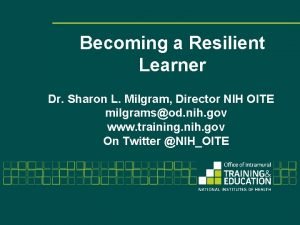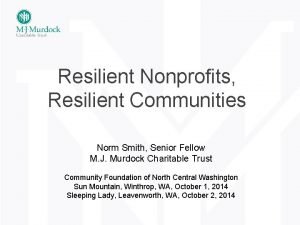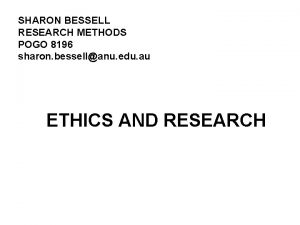Becoming a Resilient Learner Dr Sharon L Milgram

Becoming a Resilient Learner Dr. Sharon L. Milgram, Director NIH OITE milgrams@od. nih. gov www. training. nih. gov On Twitter @NIH_OITE

The Stages of Learning Competence Confidence Enthusiastic beginner Disillusioned learner Cautious performer High Achiever Low/None Some Moderate High Low Variable High What do you do? What don’t you do? Adapted from Ken Blanchard, Self Leadership and the One Minute Manager

What is Resilience? § The ability to: q adapt and grow through adversity q navigate difficult challenges with awareness, intention, and skill q find a constructive way forward during challenging time § A set of attitudes and behaviors that can be learned and developed through education, self-reflection, and practice http: //www. apa. org/helpcenter/road-resilience. aspx

Take-Aways Resilience = People + Process Those who are resilient prepare to be resilient http: //www. psychologytoday. com/blog/design-your-path/201305/10 -traitsemotionally-resilient-people

To Be Resilient We Have To n n n Learn from previous experiences, both good and bad Build strong positive relationships with peers and mentors Be proactive and use resources to thrive Mayo Clinic http: //www. mayoclinic. org/tests-procedures/resilience-training/ in-depth/resilience/art-20046311? pg=2)

To Be Resilient We Have To n n Learn from previous experiences, both good and bad Build strong positive relationships with peers and mentors Be proactive and use resources to thrive Be thoughtful about how we approach setback and engage with our negative self-talk (our inner critic) Mayo Clinic http: //www. mayoclinic. org/tests-procedures/resilience-training/ in-depth/resilience/art-20046311? pg=2)

The ABCs Activating event Beliefs Consequences The stories we tell ourselves §http: //www. mindtools. com/pages/article/abc. htm

Some Philosophy To Start From the work Marshall Rosenberg and colleagues, Nonviolent Communication; www. cnvc. org

So……. . Do you talk like a jackal or a giraffe? To yourself? To others?

The Stories We Tell Ourselves Are Often… § § More negative than the situation warrants Delivered in jackal language

Two Areas to Consider n n Cognitive distortions…. leading to pessimistic attitudes and feelings of hopelessness Imposter fears…… leading us to feel like we don’t belong https: //tinybuddha. com/blog/change-life-changing-stories-tell-yourself/

Cognitive Distortions/Automatic Negative Thoughts § § § Characteristic ways our mind convinces us of something that is really not true Reinforce negative thinking/emotions and generally serve to keep us feeling bad about ourselves Can lead us to feel very anxious and pessimistic about our situation NOTE: Our brain has a built-in negativity bias

Some ANT Examples (and a vote) n All-or-nothing thinking: Our performance is either perfect or it is a complete failure n Catastrophizing: We exaggerate the implications of a set-back or mistake n Mind reading: We make assumptions about what someone else is thinking n n Fortune telling: We predict the outcome of an event before it happens Minimizing: We downplay the importance of our accomplishments or positive qualities n Over-generalization: We take one negative event and see other similar events through that failure n Emotional Reasoning: We assume our emotions are a true reflection of the way things are

Imposter Fears The feeling of phoniness in people who believe that they are not intelligent, capable or creative despite evidence of high achievement

More on Imposter Fears n Four flavors: q Feeling like a fake q Attributing success to luck q Discounting your successes q Assuming you had to work hard and that the equivalent accomplishment was easy for everyone else § Causes: q Being a student q Being in an environment that feels foreign to you q Organizational culture and messaging q Messages from family and childhood q Stereotype threat q Working in a creative field http: //paulineroseclance. com/

Important Message YOU ARE NOT ALONE! 70+% of individuals experience imposter fears at some point in their educational and work journey.

Impacts of Cognitive Distortions and Imposter Fears n In small doses and put into perspective? q They can make us use resources and work hard n Unchecked and unquestioned? We q experience chronic stress, potentially leading to poor performance q second guess ourselves (in class, on exams, in our research group) q hesitate to ask for help q don’t volunteer for assignments or apply for competitive positions q maintain a low profile in the group q engage in self-sabotaging behavior

Explore Your Self-Talk Now § § § Use journaling for self-reflection and discovery Talk about them with mentors and peers Really getting in the way? Find a counselor, explore why and learn skills for dealing with them

And Deal With Them In The Moment § § § When you hear them -- take a deep breath, pause and stretch Acknowledge them and talk back using giraffe language Appreciate that these “stories” are a part of the human experience, the student experience, and the life-long learner experience Use your science voice to question them Find inspiration…… from a positive affirmation, a phrase, an image that makes you feel strong

An Acronym To Help - HATS Hear your negative self-talk/inner critic Appreciate you have a choice Talk back – giraffe language Seek help and access resources

And Another Strategy n Appreciative Inquiry (AI): A tool for self, group and organizational change that focuses on starting with what is working and using that as a foundation for future development q What did go well? Why did it go well? q What have I learned since the last situation like this? q If I was not afraid, what would I do now? q If I did not have any constraints, what would I do now? q What are the opportunities for growth and learning in this situation? David Cooperrider, 1980 s

Most Important Take Home Message To do well, we have to be well

Holistic Self-Care All the things we do, and avoid doing, to care for our…. Body Mind Heart Spirit

Wellness Assessment - Body Never 1…………. . 2……. 3………. …… 4…. . 5 Always § § § § I am getting enough sleep (7 -9 hours) I am eating balanced, nutritious meals I avoid excessive use of caffeine I avoid excessive use of alcohol and others drugs of abuse I am getting regular exercise (at least 3 times a week) I am getting regular health care for myself I take care of myself when I am sick, need rest, or just need a break

Wellness Assessment - Mind Never 1…………. . 2……. 3………. …… 4…. . 5 Always n n n n I avoid getting caught up in perfectionism I focus on the present vs. rehashing the past or worrying about the future I avoid negative or deceptive self-talk I practice self-affirmations and positive self-talk I avoid judging myself compared to others I give myself time to explore and learn about new things I am open to counseling as a tool to maintain and improve my health and wellbeing

Wellness Assessment - Heart Never 1…………. . 2……. 3………. …… 4…. . 5 Always n n n n I’m in touch with and let myself feel all my emotions I reach out to others for support when I need it I communicate my needs and feelings directly and honestly I make time to spend with my friends and ‘family’ I engage in activities that are fun and relaxing I avoid extreme use of my phone as a coping tool/ avoidance strategy I demonstrate compassion for myself and others

Wellness Assessment - Spirit Never 1…………. . 2……. 3………. …… 4…. . 5 Always n n n n I feel connected to something that is bigger than me – however I define that I seek out resources (practices, activities, people, places) that nurture me spiritually I reflect on and invest in what is meaningful to me I read writings or watch media that are inspirational to me I think of and care about the lives of others who are different than me I allow time to just be (human being vs. human doing) I engage in activities that support my life’s purpose

Food For Thought n n n What are you pleased about? What might you like to work on? Pick ONE new habit you would like to develop or one current habit you would like to soften/break… what will you do to make that happen?

Now Let’s Talk About the…. . Elephant(s) in the room

To Be Resilient We Have To n n n Learn from previous experiences, both good and bad Build strong positive relationships with peers and mentors Be proactive and use resources to thrive Develop our growth mindset Be thoughtful about how we approach setback and engage with our negative self-talk Do things that bring happiness and meaning to our day, week, month…. Q for U – what brings happiness and meaning to your day, week, month? Mayo Clinic http: //www. mayoclinic. org/tests-procedures/resilience-training/ in-depth/resilience/art-20046311? pg=2)

The Wellness Collage n A way to identify and talk about things that bring happiness and meaning to our lives n KEY TAKE-AWAY: Never under-estimate things in your life that bring you happiness

How About Your Wellness Collage?

Take Home Message WHERE WE ARE NOW OUR OWN INTERNAL LANDSCAPE MENTORS & LEARNING COMMUNITIES WHERE WE WANT TO GO

Powerful Tools for Change n n Community Journaling Mindfulness and meditation Counseling

And My Parting Thought

Questions?
- Slides: 36



























































